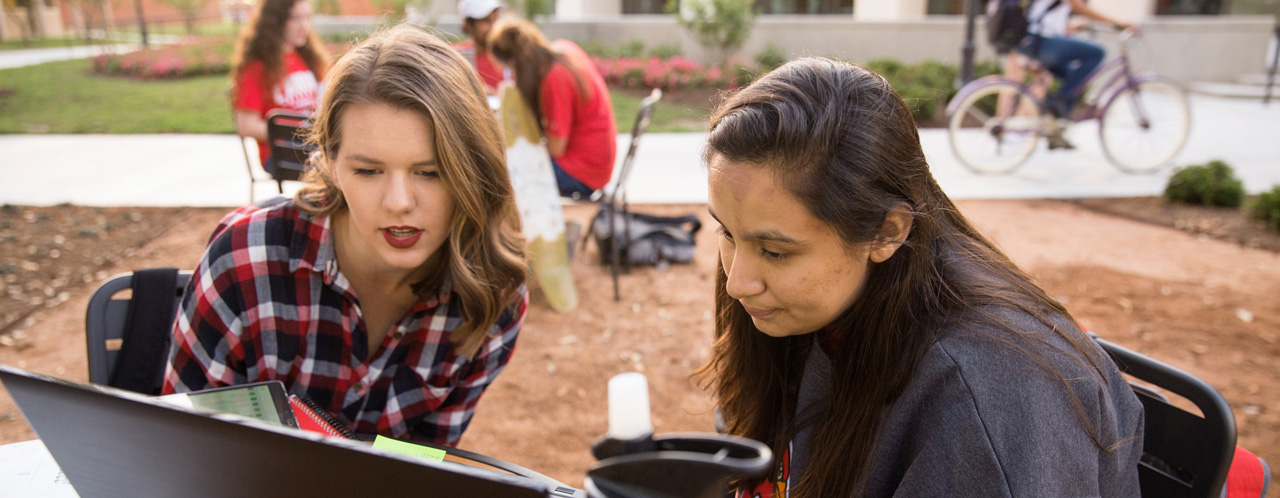Familiarizing yourself with these terms can make navigating college life and academics much easier!
-
GPA (Grade Point Average): A numerical representation of a student's academic performance on a 4.0 scale.
-
Good Academic Standing: This academic status refers to a student having a cumulative GPA of 2.0 or higher.
-
Academic Probation: A status given to students whose cumulative GPA falls below 2.0, often requiring them to improve their grades in subsequent semesters or risk suspension or dismissal.
-
Credit Hour: A unit of measurement for course workload.
-
Semester/Term: Function as a measurement of time in college. Each semester or term can range from 5-16 weeks.
-
Academic Year: The combination of fall, spring, and summer semesters. Bachelor’s degree programs typically require four academic years to complete.
-
Audit: To take a class without receiving a grade or credit for it.
-
Capstone: A final project or course designed to showcase a student's learning and skills, often in the final year.
-
Fulfills Requirement: A course or activity that counts toward fulfilling a graduation requirement, such as a general education or major requirement.
-
Major: The primary field of study that a student focuses on during their college education.
-
Minor: A secondary field of study that a student can choose alongside their major.
-
Double Major: A student pursuing two primary fields of study, requiring more coursework and planning.
-
Course Load: The number of credits a student is enrolled in for a particular semester.
-
Drop/Withdraw: To officially remove oneself from a class after the drop period ends, often impacting grades or academic record.
-
Deans' List: To qualify for the Deans’ List, an undergraduate student must carry a full course load of 12 semester hours or more and have a grade point average of 3.5 or higher for that semester.
-
President's List: Undergraduate students who qualify for the President’s List carry a full course load of 12 semester hours or more with grade point averages of 4.0 for that semester.
-
Honors Program: A specialized academic track for students who maintain higher academic standards and complete additional coursework.
-
Accelerated Program: A program that is completed in a shorter time (5-8 week increments) than traditional programs. These programs normally last 2-3 years instead of the traditional four.
-
Prerequisite: A course or requirement that must be completed before enrolling in a more advanced course.
-
Core Curriculum: A set of general education courses that all students are required to take, regardless of their major.
-
Satisfactory/Unsatisfactory: A pass/fail class is a course that does not use the standard A-F grading scale but instead offers only a satisfactory (pass) or unsatisfactory (fail) grade.
-
Full-Time: To qualify as a full-time student, learners must take a minimum number of credits per semester. At least 12 credits to qualify at the undergraduate level, and at least 9 credits to qualify at the graduate level.
-
Syllabus: A document provided by professors that outlines course content, policies, assignments, and grading.
-
Midterm/Final Exam: Exams taken at the middle or end of a semester to assess understanding of the course material.
-
Professor/Instructor: A faculty member responsible for teaching a course.
-
TA (Teaching Assistant): A graduate student or advanced undergraduate who assists the professor with teaching responsibilities like grading and leading discussion sections.
-
Dorm/Residence Hall: On-campus housing where students live during the school year.
-
RA (Resident Assistant): A student leader who helps manage dorm life and enforces housing rules.
-
Greek Life: Student organizations based on fraternities (for men) and sororities (for women), often centered around social events, community service, and leadership.
-
Club: A student-run organization focused on specific interests, activities, or causes, such as debate, arts, or community service.
-
Setzer Student Center: A central building where students can gather, eat, study, and participate in various activities.
-
Commute: The act of traveling to and from campus (often referring to off-campus students who do not live in dorms).
-
Freshman/Sophomore/Junior/Senior: Terms referring to a student's classification in college based on the number of credits earned. (Freshman = 0-29, Sophomore = 30-59, Junior = 60-89, and Senior 90-120)
-
First-Generation Student: To qualify as a first-generation college student, learners must be the first individual in their immediate family to pursue higher education.
-
Nontraditional Student: This term typically means a learner who is not a first-time student entering a bachelor’s degree program directly from high school.
-
Student Government: An elected body of students that represents the student body and organizes events or advocates for student interests.
-
Intramural Sports: Sports leagues or competitions within the college, usually for fun and open to all students, regardless of skill level.
-
Rec Center (Recreation Center): A campus facility offering fitness and sports equipment, exercise classes, and recreational activities.
-
Student Health Center: A campus facility that provides medical care and health services to students.
-
Cafeteria/Dining Hall: The primary on-campus food service area where students eat meals, often offering meal plans.
-
Spirit Week: A week of activities, usually around a big event like homecoming, designed to boost school spirit and foster a sense of community.
-
Orientation: An event or series of events designed to introduce new students to campus life, resources, and policies.
-
Study Group: A small group of students who meet to discuss course material and prepare for exams together.
-
Supplemental Instruction (S.I.): A support program that helps students do better in tough courses. It offers study sessions led by students who have already taken and done well in the course. These sessions are held outside of regular class hours.
-
Office Hours: Specific hours when professors are available to meet with students for questions or discussion about course material.
-
All-Nighter: Staying up all night to study or finish assignments.
-
Plagiarism: Using someone else’s work or ideas without proper citation, which is a serious academic violation.
-
Burnout: A state of physical, mental, or emotional exhaustion caused by excessive workload or stress.
-
Registrar: The office that manages student records, enrollment, and registration for courses.
-
Academic Advisor: A faculty or staff member who helps students plan their courses and navigate their academic path.
-
Transcript: An official record of a student's academic history, including courses taken and grades earned.
-
Financial Aid: Funding available to students to help pay for college, including scholarships, grants, loans, and work-study programs.
-
Cashier Services (Bursar): The office in charge of tuition billing, payments, and student accounts.
-
FAFSA (Free Application for Federal Student Aid): A form used to apply for federal financial aid each year.
-
TASFA (Texas Application for State Financial Aid): A form used to apply for state financial aid each year when a student is not eligible to apply for federal financial aid due to their citizenship status.
-
FERPA (Family Educational Rights and Privacy Act): A U.S. law that protects the privacy of student education records.
-
Scholarship: A financial award for students based on academic merit, financial need, or other criteria.
-
Work-Study: A federal or institutional program that provides part-time employment for students with financial need.
-
Loan: Money borrowed to pay for college that must be repaid with interest, typically after graduation.
-
Tuition: The fee charged by the college for instruction, usually based on the number of credits taken.
-
Room and Board: Fees for on-campus housing (room) and meals (board).
-
Financial Aid Package: The total amount of financial aid a student receives, which can include grants, scholarships, loans, and work-study.
-
Out-of-State Tuition: A higher tuition rate charged to students who live outside the state where they are attending school.
-
In-State Tuition: A lower tuition rate available to students who are residents of the state where they are attending school.
-
Registration: The process of signing up for courses each semester.
-
Drop/Add Period: A window at the beginning of the semester when students can add or drop classes without penalty.
-
Withdraw: A student choosing to end their enrollment status with an institution during a specific semester.
-
Career Services: A campus office that helps students with career planning, resume writing, job searching, and internships.
-
Networking: Building professional relationships with peers, professors, and alumni that can help with future career opportunities.
-
Alumni: Graduates of a college or university.
-
Resume: A summary of a student’s academic and work experience, often used to apply for internships or jobs.
-
Interview: A formal meeting where a candidate is questioned to determine their suitability for a job or internship.
-
Job Fair: An event where companies recruit students for job and internship opportunities.
-
LinkedIn: A professional networking platform used to connect with employers, alumni, and colleagues.
-
Networking Event: Events, often sponsored by alumni or career services, designed to connect students with professionals and potential employers.






